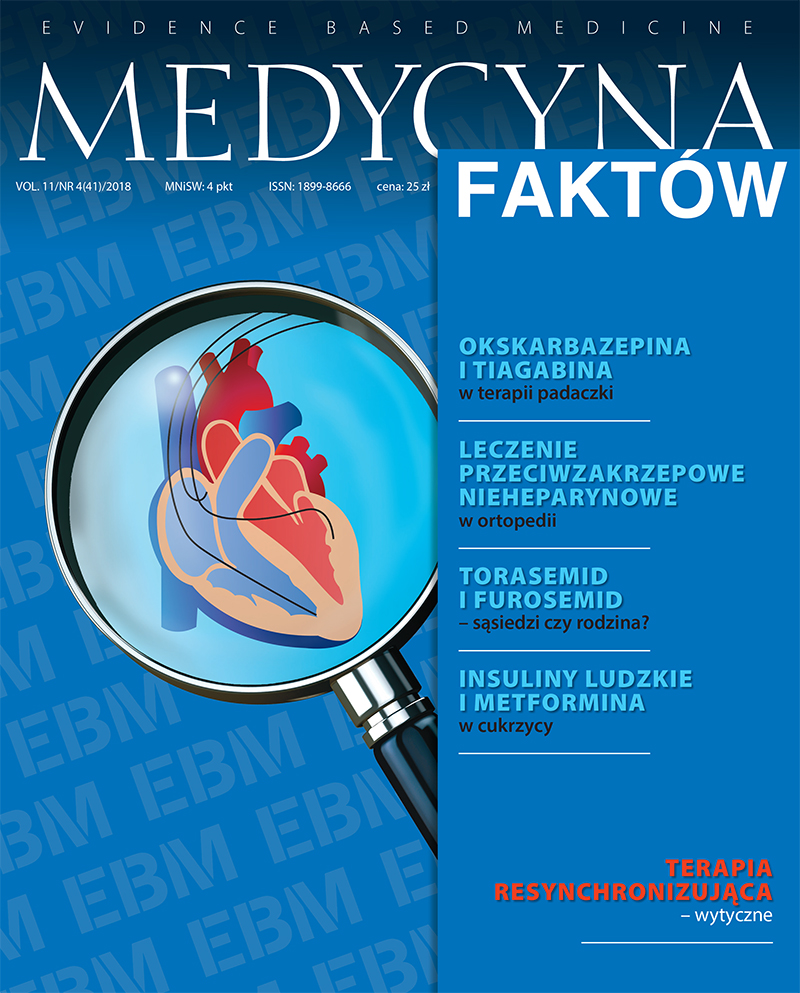Benefits of using a combined treatment of acetylcholinesterase inhibitors and quetiapine on Alzheimer’s disease Review article
Main Article Content
Abstract
Cognitive and behavioral disorders as well as psychotic symptoms are part of Alzheimer’s disease (BPSD). This is a precondition for including not only cognitive enhancing therapy, but also treatment to reduce the severity of BPSD features.
Two drugs of the group of acetylcholinesterase inhibitors (donepezil and rivastigmine), as well as memantine, are registered in Poland as part of the treatment of cognitive disorders. In the therapy of BPSD (in addition to the above-mentioned drugs) mostly atypical neuroleptics are recommended, as quetiapine, olanzapine, risperidone and tiapride. These drugs are safer than the old neuroleptics, but they also have a lot of side effects, therefore it is recommended to consider reduction or discontinuation the drugs after 3 months of BPSD therapy, unless this leads to relapse.
Quetiapine is safer compared to other atypical neuroleptics, it has fewer side effects and it is recommended to use in low dosis BDSD. It can be combined with acetylcholinesterase inhibitors treatment.
Article Details
Copyright © by Medical Education. All rights reserved.
References
2. Klich-Rączka A., Siuda J., Piotrowicz K. et al.: Zaburzenia funkcji poznawczych u osób w starszym wieku. W: Mossakowska M., Więcek A., Błędowski P. (red.): Aspekty medyczne, psychologiczne, socjologiczne i ekonomiczne starzenia się ludzi w Polsce. Termedia Wydawnictwa Medyczne, Poznań 2012.
3. Klich-Rączka A., Piotrowicz K., Mossakowska M. et al.: The assessment of cognitive impairment suspected of dementia in Polish elderly people: results of the population-based PolSenior Study. Exp. Gerontol. 2014; 57: 233-242.
4. Garre-Olmo J., Garcia-Ptacek S., Calvó-Perxas L. et al.: Diagnosis of Dementia in the Specialist Setting: A Comparison Between the Swedish Dementia Registry (SveDem) and the Registry of Dementias of Girona (ReDeGi). J. Alzheimers Dis. 2016; 53(4): 1341-1345.
5. Mayeux R., Stern Y.: Epidemiology of Alzheimer Disease. Cold Spring Harb. Perspect Med. 2012; 2(8): a006239.
6. Parnowski T., Szczudlik A., Sobów T. et al.: Zaburzenia neuropsychiatryczne w otępieniach. Uaktualnione zasady terapii. Mediadore, Warszawa 2018.
7. Diagnostyka i leczenie otępień. Rekomendacje zespołu ekspertów Polskiego Towarzystwa Alzheimerowskiego. Wydawnictwo Medisfera, Otwock 2012.
8. Gill S.S., Anderson G.M., Fischer H.D. et al.: Syncope and its consequences in patients with dementia receiving cholinesterase inhibitors: a population- based cohort study. Arch. Intern. Med. 2009; 169: 867-873.
9. Trinh N.H., Hoblyn J., Mohanty S. et al.: Efficacy of cholinesterase inhibitors in the treatment of neuropsychiatric symptoms and functional impairment in Alzheimer disease: a meta-analysis. Jama 2003; 289(2): 210-216.
10. Schneeweiss S., Setoguchi S., Brookhart A. et al.: Risk of death associated with the use of conventional versus atypical antipsychotic drugs among elderly patients. CMAJ 2007; 176(5): 627-632.
11. Ballard C., Hanney M.L., Theodoulou M. et al.: The dementia antipsychotic withdrawal trial (DART-AD): long-term follow-up of a randomised placebo-controlled trial. Lancet Neurol. 2009; 8(2): 151-157.
12. Reus V.I., Fochtmann L.J., Eyler A.E. et al.: The American Psychiatric Association Practice Guideline on the Use of Antipsychotics to Treat Agitation or Psychosis in Patients With Dementia. Am. J. Psychiatry 2016; 173(5): 543-546.
13. Ballard C., Orrell M., Sun Y. et al.: Impact of antipsychotic review and non-pharmacological intervention on health-related quality of life in people with dementia living in care homes: WHELD-a factorial cluster randomised controlled trial. Int. J Geriatr. Psychiatry 2017; 32(10): 1094-1103.
14. Mohamed S., Rosenheck R., Lyketsos C.G. et al.: Effect of second-generation antipsychotics on caregiver burden in Alzheimer’s disease. J. Clin. Psychiatry 2012; 73(1): 121-128.
15. Madhusoodanan S., Ting M.B.: Pharmacological management of behavioral symptoms associated with dementia. World J. Psychiatry 2014; 4: 72-79.
16. Cheung G., Stapelberg J.: Quetiapine for the treatment of behavioural and psychological symptoms of dementia (BPSD): a meta-analysis of randomised placebo-controlled trials. NZ Med. J. 2011; 124(1336): 39-50.
17. Jarema M. (red.): Standardy leczenia farmakologicznego niektórych zaburzeń psychicznych. Wyd. 2. Gdańsk, Via Medica 2015.
18. Rainer M., Haushofer M., Pfolz H. et al.: Quetiapine versus risperidone in elderly patients with behavioural and psychological symptoms of dementia: efficacy, safety and cognitive function. Eur. Psychiatry 2007; 22: 395-403.
19. Rungsanpanya T., Muangpaisan W., Praditsuwan R.: Clinical practice with antidementia drugs in a geriatric clinic. J. Med. Assoc. Thai. 2012; 95: 1081-1089.

